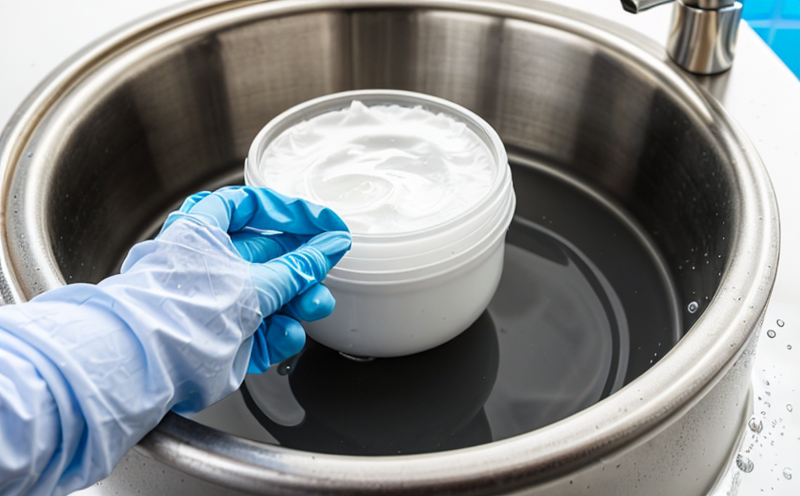CFR 21 Surfactant Testing in Food Contact Substances
The CFR Title 21, Part 173.30 covers the use of surfactants as indirect food additives in food contact substances (FCS). This regulation ensures that materials used to package or contain food do not transfer harmful substances into the food during processing, storage, or handling. Surfactants play a critical role in many FCS, including detergents, lubricants, and emulsifiers.
Our laboratory specializes in conducting comprehensive surfactant testing per CFR 21 requirements for FCS. This service ensures that the materials used in packaging or handling food meet stringent safety standards set by regulatory authorities. We understand the importance of compliance and reliability, ensuring that our clients can trust the results we provide.
The testing process involves a series of steps to ensure the surfactants do not leach harmful chemicals into the food. This includes:
- Material extraction
- Determining migration levels
- Evaluating the stability and durability of the FCS under various conditions
- Assessing the potential for chemical reactions with other components in the packaging or handling system
- Checking for compliance with relevant international standards such as ISO, ASTM, EN, IEC, etc.
The results of these tests are essential for manufacturers and suppliers to ensure their products meet regulatory requirements. Our laboratory uses state-of-the-art equipment and methodologies to provide accurate and reliable test results.
| Test Parameters | Description |
|---|---|
| Migration Limits | The maximum amount of surfactant that can migrate into food during contact. |
| Stability Testing | Assessing the surfactants' resistance to breakdown or degradation under various conditions. |
| Compatibility Tests | Evaluating how different materials interact with each other and the potential for cross-contamination. |
| Residual Solvent Testing | Determining the presence of residual solvents that may be harmful when in contact with food. |
The testing process is both precise and complex, requiring a deep understanding of surfactant chemistry and its interactions with different materials. Our team of experts ensures that every step of the process adheres to CFR 21 requirements.
Industry Applications
The testing services offered by our laboratory are crucial for various industries, including packaging manufacturers, food processors, and suppliers. Here are some key applications:
- Packaging Manufacturers: Ensuring that the materials used in packaging meet regulatory standards and do not transfer harmful substances into the food.
- Food Processors: Verifying that the equipment and tools used during processing do not introduce contaminants into the food.
- Suppliers: Guaranteeing the safety of their products when they come into contact with food, thereby protecting consumer health.
We provide a range of services to support these industries, including:
- Surfactant migration testing
- Metal ion leaching analysis
- Phenol and formaldehyde release assessment
- Evaluating the impact of surfactants on food quality and safety
The results of these tests are essential for maintaining compliance with CFR 21 regulations. This ensures that products are safe for use in the packaging or handling of food.
Environmental and Sustainability Contributions
The testing we provide plays a significant role in promoting environmental sustainability by ensuring that FCS used in food packaging do not introduce harmful substances into the environment. This is particularly important given the increasing focus on reducing waste and minimizing the impact of human activities on the environment.
Our laboratory's services contribute to sustainable practices by:
- Ensuring that materials used in packaging are safe for both consumers and the environment
- Reducing the risk of contamination, which can lead to a decrease in waste generation
- Facilitating the development of safer and more environmentally friendly food contact substances
The results of our testing also help manufacturers make informed decisions about the materials they use, leading to a reduction in unnecessary waste and environmental harm. By providing reliable and accurate test data, we support the transition towards more sustainable practices.
Competitive Advantage and Market Impact
The testing services provided by our laboratory offer significant advantages for businesses operating within the food contact substances sector. These include:
- Enhanced Compliance: Ensuring compliance with CFR 21 regulations, which helps avoid potential legal issues and fines.
- Risk Management: Identifying potential risks early in the product development process to minimize the impact on brand reputation and market presence.
- Market Access: Meeting regulatory requirements is essential for accessing international markets. Our testing services help businesses enter new markets with confidence.
- Innovation Support: Providing data that supports continuous improvement in the design and development of FCS, leading to innovative solutions.
The results of our tests are not only a compliance requirement but also an essential tool for maintaining a competitive edge. By ensuring safety and reliability, we support businesses in building trust with consumers and stakeholders.





